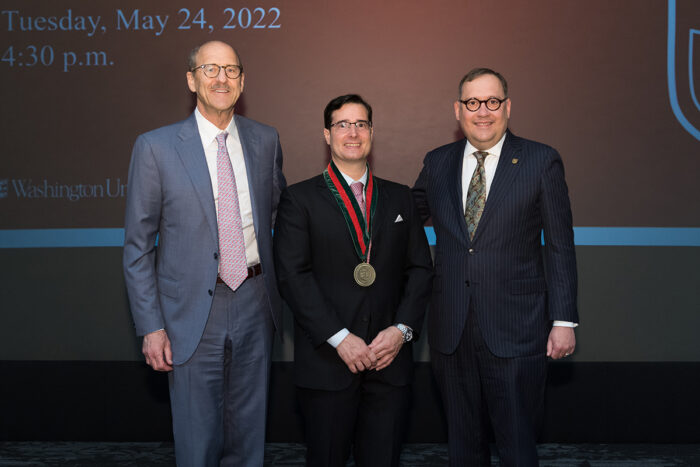Cruchaga named Morriss Professor
Studies genetic architecture of neurodegenerative diseases
 Mark Beaven
Mark BeavenCarlos Cruchaga, PhD, has been named the Barbara Burton and Reuben M. Morriss III Professor at Washington University School of Medicine in St. Louis. Shown at his installation ceremony are (from left) David H. Perlmutter, MD, executive vice chancellor for medical affairs and dean of the School of Medicine; Cruchaga; and Chancellor Andrew D. Martin.
Carlos Cruchaga, PhD, a pioneer in the use of human genomic data to understand and elucidate the biology of neurodegenerative diseases such as Alzheimer’s disease, has been named an inaugural Barbara Burton and Reuben M. Morriss III Professor at Washington University School of Medicine in St. Louis.
Cruchaga was installed by Chancellor Andrew D. Martin and David H. Perlmutter, MD, executive vice chancellor for medical affairs, the George and Carol Bauer Dean of the School of Medicine and the Spencer T. and Ann W. Olin Distinguished Professor.
The professorship was created through a bequest from the late Reuben M. Morriss III and Barbara Burton Morriss to Washington University, to advance Alzheimer’s disease research.
“The Morrisses were devoted members of the St. Louis community, and their investment in Washington University and specifically in Alzheimer’s research has created three endowed professorships bearing their names,” Martin said. “Through their generous gift to the university, they will continue to have a powerful impact on research and teaching at the university in perpetuity.”
Added Perlmutter: “We are deeply grateful to Barbara and Reuben Morriss for investing in Washington University and in our work to advance the understanding and treatment of Alzheimer’s disease. We look forward to future discoveries from the Cruchaga lab as Carlos combines complex technologies to identify genetic variants that may contribute to Alzheimer’s, Parkinson’s disease and other devastating disorders.”
Cruchaga’s research focuses on leveraging data from genetics, genomics and other omics and integrating that information with findings from neuroimaging and neuropathology to identify novel genes, biological pathways, molecular biomarkers and drug targets that may generate new approaches to diagnosing and treating neurodegenerative illnesses.
“Carlos came to Washington University as a postdoc to study the genetics of neurodegenerative illnesses,” said Charles F. Zorumski, MD, the Samuel Guze Professor and head of the Department of Psychiatry. “In 2014, Carlos became the leader of the genetics group at the Knight Alzheimer Disease Research Center (ADRC) and at the Hope Center for Neurological Disorders in the Department of Neurology. And last year he became the founding director of the Neurogenomics and Informatics Center, pioneering approaches to improve the understanding of causes and potential treatments for these devastating illnesses.”
Cruchaga has published more than 270 manuscripts and is the principal investigator on six grants funded by the National Institutes of Health (NIH). He is a core leader for the biobank and genetics core of the international Dystonia Coalition; the Aging Adult Brain Connectome project; the Alzheimer’s Biomarkers Consortium-Down Syndrome; the Knight ADRC genetics core; and the Dominantly Inherited Alzheimer Network (DIAN) genetics core.
Cruchaga earned his doctorate in biochemistry and molecular biology in 2005 at the University of Navarra in Pamplona, Spain. As a postdoc, he trained in quantitative human genomics in the laboratory of Alison Goate, DPhil, at Washington University. He established his own laboratory in 2011. His key aim has been to leverage genetics, multi-omics and functional genomics studies in neurodegeneration and diseases of the central nervous system and to translate those into improvements in human health by better understanding the molecular underpinnings of disease.
“It is quite an honor to have our work recognized in this way,” Cruchaga said. “We have been attempting to leverage a great deal of information to identify treatments that might make a big difference in the lives of millions of people affected by Alzheimer’s disease and other neurodegenerative disorders. This endowment allows us to advance that work, help patients and provide hope for those affected by some very distressing diseases.”
A graduate of Saint Louis Country Day School in Ladue, Mo., and Princeton University in New Jersey, Reuben Morriss III earned a law degree from Washington University in 1964. He joined Boatmen’s Bank, beginning a long career as a leader of the St. Louis financial sector. He eventually became chairman and president of Boatmen’s Trust Co., a position he held until his retirement in 1995. He was a board chair of Mary Institute and Saint Louis Country Day School and of William Woods University in Fulton, Mo. He also served on the boards of St. Luke’s Hospital in Chesterfield, Mo., and the St. Louis Bi-State American Red Cross.
Barbara Burton Morris was a graduate of John Burroughs School in Ladue, and Briarcliff College in Westchester County, N.Y. She was a board member of the Alzheimer’s Association and the Central Institute for the Deaf, and she donated time and resources to many other local charitable and cultural institutions.
The couple was married for 48 years and had two children, Burton Douglass Morriss and Barbara Dulany Morriss; and five grandchildren. Reuben Morriss III died in 2006, and Barbara Burton Morriss died in 2018.






